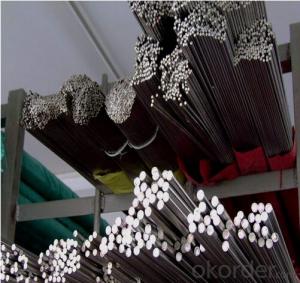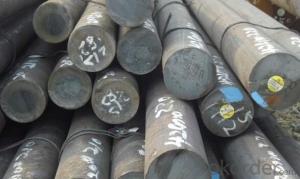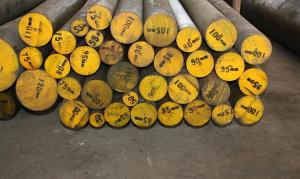GCr15 Bearing Steel Special Steel Carbon Steel
- Loading Port:
- China main port
- Payment Terms:
- TT OR LC
- Min Order Qty:
- 25 m.t.
- Supply Capability:
- 10000 m.t./month
OKorder Service Pledge
OKorder Financial Service
You Might Also Like
Item specifice
1.round steel
2.ISO9001:2008 certificate
3.Competive price and Best quality
4.On-time delivery
Chemical Composition(GB)%
C | Si | Mn | Cr | Cu | S |
0.95-1.05 | 0.15-0.35 | 0.25-0.45 | 1.4-1.65 | ≤0.20 | ≤0.020 |
Heat Treatment
Item | Temperature ℃ | Hardness |
Anneal | 790-810 | 170-207HB |
Quenching | 830-860 | 62-66HRC |
Tempering | 150-180 | 61-66HRC |
Characterstics
1.Uniform hardness,Good abrasion resistance |
2.High contact fatigue resistance |
3.Cutting performance in general |
Applications:
Used to make the load of the larger small cross-section conditioning and stress smaller large parts
Product show:

Workshop show:

FAQ:
1, Your advantages?
professional products inquiry, products knowledge train (for agents), smooth goods delivery, excellent customer solution proposale
2, Test & Certificate?
SGS test is available, customer inspection before shipping is welcome, third party inspection is no problem
3, Payment Terms?
30% TT as deposit and 70% before delivery.
Irrevocable L/C at sight.
4, Trading Terms?
EXW, FOB, CIF, FFR, CNF
5, After-sale Service?
We provides the services and support you need for every step of our cooperation. We're the business partner you can trust.
For any problem, please kindly contact us at any your convenient time.
We'll reply you in our first priority within 24 hours.
- Q:What are the properties of high-strength tool steel?
- High-strength tool steel typically possesses excellent hardness, toughness, wear resistance, and ability to retain its shape even under high temperatures and pressures. It is known for its durability, ability to withstand heavy loads, and resistance to deformation, making it ideal for demanding applications in tooling and machining.
- Q:Can special steel be used in the power transmission industry?
- Yes, special steel can be used in the power transmission industry. Special steel alloys, such as high-strength and corrosion-resistant varieties, are often used to manufacture components like gears, shafts, and bearings in power transmission systems. These special steels offer improved durability, increased load capacity, and better resistance to wear and fatigue, making them suitable for the demanding conditions of the power transmission industry.
- Q:What are the properties of electrical resistance steel?
- Electrical resistance steel, also known as resistivity steel, possesses specific properties that make it suitable for various electrical applications. This type of steel has a high resistivity, meaning it resists the flow of electrical current more than other materials. It also exhibits low electrical conductivity, making it an ideal choice for applications that require insulation or the control of electrical current. Additionally, electrical resistance steel typically has good mechanical strength, corrosion resistance, and can withstand high temperatures, making it suitable for use in electrical resistors, heating elements, and other similar devices.
- Q:What are the different corrosion-resistant coatings for special steel?
- There are several different corrosion-resistant coatings available for special steel, each with their own unique properties and advantages. Some of the most common ones include: 1. Zinc Coating: Zinc coatings, such as galvanizing, are widely used to protect special steel from corrosion. The zinc layer acts as a sacrificial barrier, preventing the steel from coming into contact with corrosive elements. 2. Epoxy Coating: Epoxy coatings are a popular choice for corrosion protection due to their excellent adhesion, chemical resistance, and durability. They form a strong barrier that shields the special steel from moisture, chemicals, and other corrosive agents. 3. Polyurethane Coating: Polyurethane coatings provide exceptional resistance to abrasion, chemicals, and weathering. They are often used in harsh environments where the special steel is exposed to extreme conditions, such as offshore or marine applications. 4. Ceramic Coating: Ceramic coatings offer high-temperature resistance and excellent corrosion protection. They are commonly used in industries like aerospace and automotive, where the special steel needs to withstand extreme temperatures and corrosive environments. 5. Metal Coating: Metal coatings, such as nickel or chromium, are often applied to special steel to enhance its corrosion resistance. These coatings create a protective layer that prevents the steel from corroding by acting as a physical barrier. 6. Powder Coating: Powder coatings are applied electrostatically and then cured under heat, forming a hard and durable protective layer. They offer excellent corrosion resistance and can be customized in terms of color and texture. It is important to select the appropriate corrosion-resistant coating based on the specific requirements of the special steel and the environment in which it will be used. Factors such as temperature, exposure to chemicals or moisture, and the desired lifespan of the coating should all be considered when choosing the right coating.
- Q:What are the main advantages of using special steel in the automotive industry?
- The main advantages of using special steel in the automotive industry are its high strength-to-weight ratio, improved durability and resistance to corrosion, and enhanced crashworthiness. Special steel allows for the production of lighter vehicles without compromising safety, resulting in improved fuel efficiency and reduced emissions. Additionally, its superior mechanical properties make it suitable for critical components, enhancing the overall performance and reliability of automobiles.
- Q:What are the different mechanical defects in special steel?
- Special steel can be compromised in its overall strength and performance by various mechanical defects. The most common defects are: 1. Inclusions: These are foreign particles or impurities found in the steel, including oxides, sulfides, or other non-metallic materials. Inclusions weaken the steel, reducing its ductility and making it more prone to cracking or failure. 2. Segregation: Uneven distribution of alloying elements within the steel is known as segregation. This can cause variations in hardness, strength, and other mechanical properties throughout the material. Segregation creates localized areas of weakness, increasing the risk of failure under stress. 3. Cracks: Special steel can develop cracks due to factors like improper cooling, excessive heat, or high levels of stress. These cracks significantly reduce the structural integrity of the steel and may spread over time, leading to catastrophic failure. 4. Laminations: Thin layers or sheets of material, called laminations, can form during the manufacturing process. They occur due to improper rolling or forging, or the presence of inclusions. Laminations weaken the steel and cause premature failure under load. 5. Decarburization: Exposure to high temperatures or oxidation causes decarburization, which is the loss of carbon from the steel's surface. This results in a layer of softer, lower carbon steel on the surface, reducing the material's overall hardness and strength. 6. Grain growth: Over time, the individual crystals within the steel (grains) can grow larger, leading to grain growth. High temperatures, prolonged stress exposure, or improper heat treatment can cause this. Grain growth reduces the steel's strength and toughness, making it more susceptible to deformation or fracture. It is important to understand that the severity of these mechanical defects can vary and is influenced by factors such as the manufacturing process, quality control measures, and the specific composition of the special steel. Regular inspection, testing, and adherence to proper handling and processing techniques are crucial in minimizing these defects and ensuring the desired mechanical properties of special steel.
- Q:What are the different welding methods used for special steel?
- There exists a range of welding methods that can be utilized for special steel, contingent upon the specific needs of the project. Some of the commonly employed welding methods for special steel comprise the following: 1. Gas Metal Arc Welding (GMAW): Also known as MIG welding, this technique employs a consumable electrode and a shielding gas to safeguard the weld against atmospheric contamination. GMAW is advantageous for welding special steel due to its ability to produce high-quality welds with minimal spatter. 2. Gas Tungsten Arc Welding (GTAW): Also known as TIG welding, this method employs a non-consumable tungsten electrode and a shielding gas to protect the weld. GTAW is frequently employed for special steel as it allows for precise control during the welding process, resulting in defect-free, high-quality welds. 3. Shielded Metal Arc Welding (SMAW): Also known as stick welding, this technique utilizes a consumable electrode coated in flux to shield the weld. SMAW is widely employed for special steel due to its versatility and portability, making it suitable for various positions and environments. 4. Flux-cored Arc Welding (FCAW): This method employs a tubular electrode filled with flux to safeguard the weld. FCAW is often utilized for special steel due to its ability to achieve high deposition rates and deep penetration, making it suitable for thicker materials. 5. Submerged Arc Welding (SAW): This technique employs a continuously fed wire electrode and a granular flux applied around the weld. SAW is commonly used for special steel as it can produce high-quality welds in thick sections. It is crucial to consider various factors, such as the type and thickness of the steel, the desired weld quality, and the specific application requirements, when selecting the appropriate welding method for special steel. Therefore, it is advisable to consult with welding professionals or engineers to determine the most suitable method for a particular project involving special steel.
- Q:What are the different classifications of special steel?
- Special steel is a broad term that encompasses various types of steel alloys that possess unique properties and characteristics, making them suitable for specific applications. There are several classifications of special steel, including: 1. Stainless Steel: This type of special steel contains a high percentage of chromium, which provides excellent corrosion resistance. It also typically contains other elements like nickel and molybdenum, enhancing its strength and durability. Stainless steel is commonly used in applications that require resistance to oxidation, heat, chemicals, and wear, such as in food processing, medical devices, and construction. 2. Tool Steel: Tool steel is specifically designed for manufacturing tools, dies, and molds. It is known for its exceptional hardness, wear resistance, and toughness. Tool steel is further classified into several subcategories, including high-speed steel (HSS), cold work steel, hot work steel, and plastic mold steel, each tailored for specific tooling applications. 3. Alloy Steel: Alloy steel is a type of special steel that contains additional alloying elements apart from carbon. These elements, such as manganese, silicon, nickel, chromium, and molybdenum, are added to enhance specific properties like strength, toughness, hardenability, and corrosion resistance. Alloy steels are used in various applications, such as automotive components, machinery, construction, and aerospace. 4. Spring Steel: This type of special steel is specifically designed to withstand repeated bending or twisting without permanently deforming. Spring steel has excellent elasticity and fatigue resistance, making it suitable for applications such as springs, suspension systems, and high-performance automotive parts. 5. Bearing Steel: Bearing steel is engineered to provide high hardness, wear resistance, and dimensional stability necessary for manufacturing bearings. It typically contains high levels of carbon, chromium, and other alloying elements, ensuring the required mechanical properties for reliable and long-lasting bearings. 6. Electrical Steel: Electrical steel, also known as silicon steel, is specifically designed for electrical applications. It possesses low electrical resistivity and high magnetic permeability, allowing it to efficiently conduct and transform electrical energy. Electrical steel is commonly used in transformers, electric motors, and generators. These classifications of special steel highlight the versatility and tailored properties of different steel alloys, enabling their application in a wide range of industries and specialized uses.
- Q:What is the impact of manganese in special steel alloys?
- The presence of manganese in special steel alloys is crucial as it greatly affects their properties and performance. These alloys, also referred to as high-strength or low-alloy steels, are specifically designed to possess improved mechanical properties, including increased strength, durability, and resistance to wear and corrosion. In order to achieve these desired characteristics, manganese, along with other alloying elements such as nickel, chromium, and molybdenum, is incorporated into the steel. One of the major impacts of manganese in special steel alloys lies in its capacity to enhance the hardenability of the steel. During the solidification and cooling process, manganese promotes the formation of fine-grained structures, which ultimately leads to improved strength and toughness. This particular property is of utmost importance in applications where the steel needs to endure heavy loads, shocks, or extreme temperatures. Moreover, manganese aids in reducing the brittleness of the steel and improving its weldability. By forming a solid solution with iron, it prevents the formation of detrimental iron sulfides, which can cause brittleness and hinder the steel's weldability. Consequently, manganese becomes an essential element in steels utilized in various industries such as fabrication, construction, and automotive, where welding is a common practice. In addition, manganese contributes to the steel's resistance against corrosion and oxidation. It creates a protective oxide layer on the surface of the steel, effectively preventing the intrusion of oxygen and moisture. This particular property proves to be highly advantageous in industries where the steel is exposed to harsh environments or corrosive substances, such as marine applications, chemical processing plants, or oil and gas refineries. Furthermore, manganese enhances the hardenability and wear resistance of the steel, making it suitable for the production of tools, machinery parts, and cutting edges. It heightens the steel's ability to undergo heat treatment, thus enabling the attainment of desired hardness and strength through processes like quenching and tempering. In conclusion, the inclusion of manganese in special steel alloys significantly enhances their hardenability, weldability, toughness, corrosion resistance, and wear resistance. Its addition enables the production of high-strength and durable materials capable of withstanding demanding applications and environments.
- Q:How does special steel contribute to the electrical industry?
- Special steel plays a crucial role in the electrical industry by contributing to the production of various components and equipment necessary for generating, transmitting, and distributing electricity. One important application of special steel in the electrical industry is in the manufacturing of power transformers. These transformers are essential for stepping up or stepping down the voltage levels in the electricity grid, enabling efficient transmission and distribution of electricity. Special steel, with its high strength, durability, and excellent magnetic properties, is used to construct the transformer cores. The high magnetic permeability of special steel ensures minimal energy loss during the transformation process, resulting in more efficient power transmission. Furthermore, special steel is also extensively used in the production of electrical conductors, such as wires and cables. These conductors are responsible for carrying electricity from power plants to various end-use applications. Special steel wires are known for their high conductivity and resistance to corrosion, making them ideal for transmitting electricity over long distances with minimal energy loss. Additionally, special steel is used in the manufacturing of electrical connectors and terminals, ensuring secure and reliable connections between different electrical components. In the electrical industry, special steel is also employed in the fabrication of electrical motors and generators. The high strength and magnetic properties of special steel contribute to the efficient conversion of electrical energy into mechanical energy, enabling the smooth operation of motors and generators. Moreover, special steel is used for manufacturing electrical switches, circuit breakers, and other protective devices, ensuring the safe and reliable functioning of electrical systems. Overall, special steel plays a vital role in the electrical industry by facilitating the production of essential components and equipment necessary for the generation, transmission, and distribution of electricity. Its unique properties contribute to improved energy efficiency, reliability, and safety in electrical systems, making it an indispensable material in this industry.
1. Manufacturer Overview |
|
|---|---|
| Location | |
| Year Established | |
| Annual Output Value | |
| Main Markets | |
| Company Certifications | |
2. Manufacturer Certificates |
|
|---|---|
| a) Certification Name | |
| Range | |
| Reference | |
| Validity Period | |
3. Manufacturer Capability |
|
|---|---|
| a)Trade Capacity | |
| Nearest Port | |
| Export Percentage | |
| No.of Employees in Trade Department | |
| Language Spoken: | |
| b)Factory Information | |
| Factory Size: | |
| No. of Production Lines | |
| Contract Manufacturing | |
| Product Price Range | |
Send your message to us
GCr15 Bearing Steel Special Steel Carbon Steel
- Loading Port:
- China main port
- Payment Terms:
- TT OR LC
- Min Order Qty:
- 25 m.t.
- Supply Capability:
- 10000 m.t./month
OKorder Service Pledge
OKorder Financial Service
Similar products
New products
Hot products
Related keywords





























